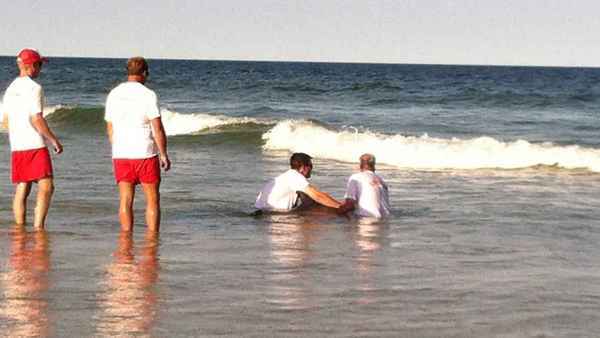State deploys additional resources in response to ongoing dolphin die-off

Lifeguards assisting a sick dolphin at Island Beach State Park earlier this month. The dolphin later died. (Photo: Sandy Bartkiewicz Rea via Jersey Shore Hurricane News)
The Christie administration today directed additional state resources toward the investigation of bottlenose dolphin deaths from New York to Virginia that federal officials say is due to a naturally occurring disease cycle.
The measure includes deploying Department of Environmental Protection aircraft and expanding patrols by DEP conservation officers, courtesy of a $92,000 grant from the National Ocean and Atmospheric Administration, and diagnostic testing at a state laboratory.
The Department of Agriculture’s Animal Health Diagnostic Laboratory will provide testing on recovered dolphins, benefiting the Brigantine-based Marine Mammal Stranding Center, which has been responding to dolphin deaths along the New Jersey coastline since July and paying for the cost of testing at a University of Pennsylvania veterinary facility.
“The Department of Agriculture’s Animal Health Diagnostic Laboratory is a state-of-the-art facility that is well-equipped to handle testing of large animals,” said New Jersey Secretary of Agriculture Douglas H. Fisher. “We are eager to do whatever we can to assist in the investigation of what has been sickening and killing the dolphins. “
The DEP, which already undertakes coastal surveillance flight missions as part of the state’s water quality monitoring effort, will expand its scope to look for stranded dolphins in the ocean beyond the standard summer water monitoring season, coordinating observations with the Marine Mammal Stranding Center and DEP’s Fish and Wildlife Conservation officers, who have been utilizing their boats and tracking the die-off, for potential recoveries.
“Fortunately, the federal investigation into the dolphin deaths is making significant progress,” DEP Commissioner Bob Martin said. “The Christie administration is committed to doing everything we can to assist in this investigation, and to helping the Marine Mammal Stranding Center in their work to respond to this sad situation.”
Bob Schoelkopf, the Marine Mammal Stranding Center’s Executive Director, says the mission continues for his small non-profit organization.
“While we hope the disease cycle is reaching its peak in New Jersey, we really don’t know how much longer this situation will continue,” Schoelkopf said. “We are extremely appreciative for all of this assistance, which will relieve a great deal of pressure on our small organization.”
Since July 9, 74 dead or dying dolphins have washed ashore along the Jersey Shore. Twelve have been confirmed with morbillivirus, a measles-like virus, according to Schoelkopf. Another 21 have been tested for the virus, with results of those tests pending.
Schoelkopf told Jersey Shore Hurricane News and NewsWorks in July to not enter the water to recover the marine mammals due to the risk of sharks feeding on dead or dying dolphins. Division of Fish and Wildlife Law Enforcement Chief Mark Chicketano also warns humans to avoid contact with the marine mammals.
“There is a risk to the public of contracting a secondary pathogen from a dead or dying dolphin. We continue to advise the public not to approach or try to help a stranded or dead dolphin, but to let the experts retrieve the animal,” Chicketano said.
If you see a dead or dying dolphin, call the Marine Mammal Stranding Center’s 24-hour hotline at 609-266-0538 or call the DEP hotline at 877-WARNDEP (877-927-6337).
WHYY is your source for fact-based, in-depth journalism and information. As a nonprofit organization, we rely on financial support from readers like you. Please give today.

